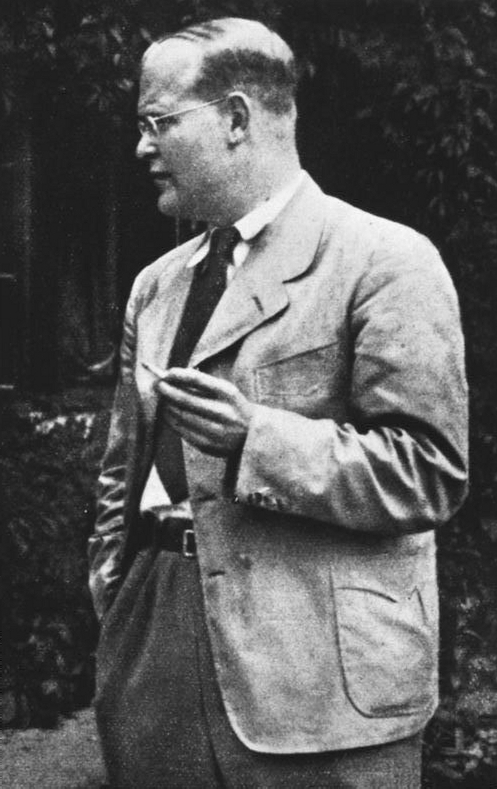Origine: Citato in Ermes Ronchi, Sciogliere le vele. Commento ai vangeli festivi. Anno A, Edizioni San Paolo, 2004, p. 92.
Dietrich Bonhoeffer frasi celebri
libro Oltre la rottamazione: Nessun giorno è sbagliato per provare a cambiare
Origine: Da Della stupidità.
§ 273
Sequela
Origine: Citato in Gibellini, p. 115.
Origine: Da Chi sono io?, in Chi sono io? Meditazioni dal carcere, traduzione di Manuel Kromer, Claudiana, Torino, 2005, p. 9. ISBN 88-7016-514-0
Origine: Da una delle ultime lettere dal carcere, 3 agosto 1944; citato in Gibellini, p. 126.
Frasi su Dio di Dietrich Bonhoeffer
“Dio non esaudisce i nostri desideri, ma realizza le sue promesse.”
Origine: Citato in Messaggero di San'Antonio, dicembre 2009, p. 10.
Origine: Citato da Ermes Ronchi in Le ragioni della speranza, Rai Uno, 17 gennaio 2010.
Origine: Citato in Enzo Bianchi, La differenza cristiana, Einaudi, 2006, I, 4.
Dietrich Bonhoeffer Frasi e Citazioni
Origine: Da Etica; citato in Andrew Linzey, Teologia animale, traduzione di Alessandro Arrigoni, Cosmopolis, Torino, 1998, p. 22. ISBN 978-88-87947-01-4
“Il Regno di Dio è il regno della risurrezione in terra.”
Venga il tuo regno
“Non siate uomini ai margini della realtà, ma siate forti!”
Venga il tuo regno
Origine: Da Cristologia, § 12; citato in Gibellini, p. 113.
Origine: Da Pregare i Salmi con Cristo; citato in Gianfranco Ravasi, L'incontro: ritrovarsi nella preghiera, Oscar Mondadori, Milano, 2014, p. 10. ISBN 978-88-04-63591-8
Dietrich Bonhoeffer: Frasi in inglese
Letters and Papers from Prison (1967; 1997), The Friend
Origine: Letters and Papers from Prison (1967; 1997), Who Stands Fast?, p. 5.
translated as The Cost of Discipleship (1959), p. 51.
Discipleship (1937), Costly Grace
Origine: Discipleship (1937), Truthfulness, p. 138.
exegesis of Matthew 5:13, p. 118.
Discipleship (1937), The Visible Community
Attributed to Bonhoeffer on the internet, but this is from a remark about him, not by him, in Eric Metaxas, Bonhoeffer: Pastor, Martyr, Prophet, Spy http://books.google.com/books?id=aG0q3X8TVpsC&pg=PA486#v=onepage (2010), p. 486.
Misattributed
Origine: Discipleship (1937), The Beatitudes, p. 108.
Origine: Discipleship (1937), The Righteousness of Christ, p. 122.
Origine: Discipleship (1937), The Hidden Righteousness, p. 158.
Origine: Discipleship (1937), The Enemy, the "Extraordinary", p. 150.
Letters and Papers from Prison (1967; 1997), The Friend
Origine: Discipleship (1937), The Enemy, the "Extraordinary", pp. 147-148.
“Blessed are they that mourn, for they shall be comforted.”
With each beatitude the gulf is widened between the disciples and the people, their call to come forth from the people becomes increasingly manifest. By “mourning” Jesus, of course, means doing without what the world calls peace and prosperity: He means refusing to be in tune with the world or to accommodate oneself to its standards. Such men mourn for the world, for its guilt, its fate, and its fortune.
Origine: Discipleship (1937), The Beatitudes, p. 108.
Letters and Papers from Prison (1967; 1997), The Friend
Origine: Letters and Papers from Prison (1967; 1997), Are we still of any use?, p. 16
by seeking deliverance from self-will through service to the community. Calling and freedom were to him two sides of the same thing. But in this he misjudged the world; he did not realize that his submissiveness and self-sacrifice could be exploited for evil ends. When that happened, the exercise of the calling itself became questionable, and all the moral principles of the German were bound to totter. The fact could not be escaped that the Germans still lacked something fundamental: he could not see the need for free and responsible action, even in opposition to the task and his calling; in its place there appeared on the one hand an irresponsible lack of scruple, and on the other a self-tormenting punctiliousness that never led to action. Civil courage, in fact, can grow only out of the free responsibility of free men. Only now are the Germans beginning to discover the meaning of free responsibility. It depends on a God who demands responsible action in a bold venture of faith, and who promises forgiveness and consolation to the man who becomes a sinner in that venture.
Origine: Letters and Papers from Prison (1967; 1997), Civil Courage, p. 5
Origine: Meditations on the Cross (1996), Back to the Cross, p. 3
Origine: Discipleship (1937), Discipleship and the Cross, p. 88
Origine: Discipleship (1937), Revenge, p. 142
Origine: Discipleship (1937), Revenge, p. 142
Origine: Discipleship (1937), Revenge, p. 141
Origine: Discipleship (1937), Discipleship and the Cross, p. 87
Origine: Discipleship (1937), Discipleship and the Cross, p. 86
Origine: Discipleship (1937), Discipleship and the Cross, p. 85
Origine: Discipleship (1937), Discipleship and the Cross, p. 84
translated as The Cost of Discipleship (1959), p. 51
Discipleship (1937), Costly Grace
"Preface", as translated by Barbara Green and Reihhard Krauss (2001)
Discipleship (1937)
Origine: Costly Grace (1937), p. 49
Origine: Costly Grace (1937), p. 45
p 43
Costly Grace (1937)
